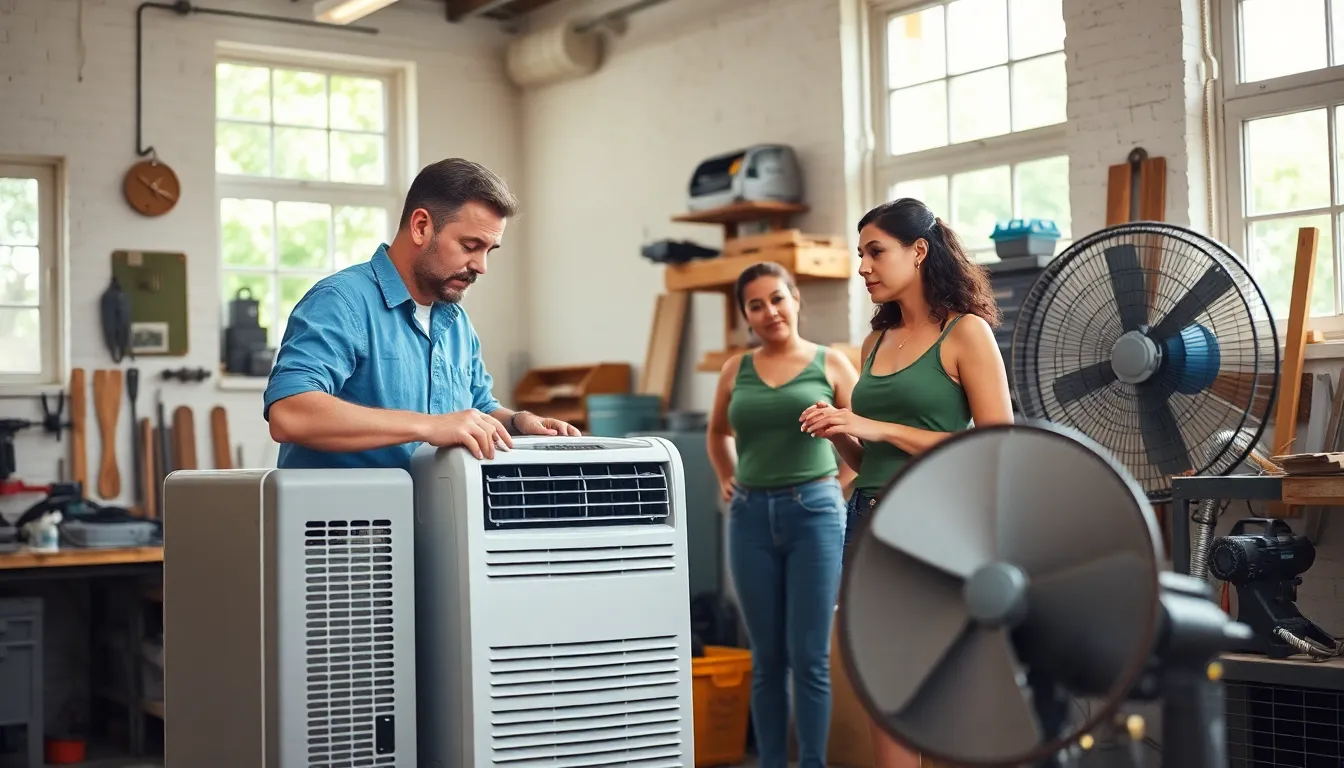Table of Contents
ToggleIn the bustling world of workshops, where creativity meets machinery, a hot day can turn inspiration into perspiration faster than you can say “overheated tool.” Nobody wants to be the person who’s sweating bullets while trying to craft the next big thing. That’s where workshop cooling solutions come in, ready to save the day and keep those creative juices flowing.
Overview of Workshop Cooling Solutions
Workshop cooling solutions play a crucial role in enhancing comfort and maintaining productivity. Various options exist, each catering to different workshop sizes and specific needs.
Portable air conditioners provide flexibility and can be moved to any location within the workshop. These units cool the air quickly and often come with dehumidification features, improving overall comfort.
Evaporative coolers, also known as swamp coolers, work by drawing warmer air through water-saturated pads. They are effective in dry climates, where humidity levels are low, and can significantly lower temperatures when outdoor air is cooler.
Industrial fans circulate air efficiently. With various types available, including ceiling fans and wall-mounted models, they help to create a consistent airflow, preventing hot spots in the workshop.
Ventilation systems remain essential for maintaining fresh air circulation. They can address both temperature control and air quality, ensuring that fumes or dust from workshop activities don’t become overwhelming.
Some workshops utilize insulation to enhance cooling efficiency. Proper insulation minimizes heat gain during hot weather, reducing energy expenditures and workload on cooling equipment.
Investing in any of these solutions ensures a more comfortable working environment. Effective cooling solutions not only improve worker well-being but also enhance focus and creativity in the workshop.
Importance of Effective Cooling

Effective cooling in workshops significantly enhances comfort and productivity. High temperatures create discomfort, causing distractions that impede focus on creative projects.
Impact on Productivity
High temperatures directly impact overall productivity. Workers in cooler environments tend to complete tasks more efficiently compared to those in heat-stressed settings. Research indicates that productivity can decline by up to 20 percent for every 10°F increase in temperature. When air conditioning or ventilation maintains a comfortable atmosphere, creativity flourishes, allowing individuals to concentrate better on their work. By preventing fatigue and promoting wellness, effective cooling solutions serve as vital components in fostering a productive workspace.
Effects on Equipment Longevity
Cool environments contribute to the longevity of workshop equipment. Elevated temperatures can cause overheating in tools and machines, damaging sensitive components. Regular cooling reduces wear and tear, extending the lifespan of equipment significantly. For example, proper cooling might double the lifespan of specific power tools. Additionally, maintaining an optimal temperature prevents overheating and unplanned maintenance, ensuring smoother operations. Consequently, investing in cooling solutions not only protects equipment but also promotes consistent performance and efficiency.
Types of Workshop Cooling Solutions
Various cooling solutions help maintain comfortable workshop environments. Each solution plays a vital role in promoting productivity and comfort during hot weather conditions.
Portable Cooling Units
Portable cooling units provide flexibility in workshop settings. These units are easy to move from one area to another, targeting hot spots efficiently. With quick setup, they deliver rapid cooling, accommodating different workshop layouts. Many units feature adjustable settings, allowing individuals to customize their cooling experience. For operations that require temporary cooling, portable options are invaluable.
Evaporative Coolers
Evaporative coolers excel in dry climates where humidity is low. These devices use water to cool air through evaporation, resulting in refreshing breezes. They consume less energy compared to traditional air conditioning systems, making them cost-effective. Placing evaporative coolers near open windows maximizes their effectiveness, drawing in fresh air while circulating cool air. Workshops can benefit significantly from these energy-efficient solutions during hot summer months.
Air Conditioning Systems
Air conditioning systems deliver consistent temperatures throughout the workshop. Different types of systems exist, including central and ductless units, each catering to specific needs. Effective air conditioning not only cools spaces but also dehumidifies air, improving comfort and equipment longevity. Regular maintenance enhances system performance, reducing potential breakdowns. Professionals often choose air conditioning for large workshops requiring consistent cooling over extended periods.
Fans and Ventilation
Fans and ventilation systems ensure air circulates properly in workshops. High-velocity fans can quickly dissipate heat and create airflow, reducing the perceived temperature. Proper ventilation prevents the buildup of heat and moisture, ensuring a fresh work environment. Strategically placed exhaust fans help eliminate stale air, promoting healthier air quality. Individuals can achieve improved comfort and productivity by utilizing fans and ventilation solutions effectively.
Factors to Consider in Choosing a Cooling Solution
Choosing the right cooling solution involves several critical factors to ensure comfort and efficiency in the workshop environment.
Size of the Workshop
Size significantly impacts cooling requirements. Larger workshops typically need more powerful units to maintain optimal temperatures. In contrast, smaller spaces may benefit from portable air conditioners or fans. An accurate assessment of the workshop’s square footage simplifies the selection process. Properly sized units operate more efficiently, reducing energy costs over time. Calculating the workshop’s dimensions ensures the chosen solution meets specific cooling needs.
Equipment and Machinery Needs
Equipment type and usage frequency influence cooling decisions. Certain machinery generates substantial heat during operation, necessitating robust cooling solutions. For example, workshops that utilize high-performance tools may require industrial air conditioners or powerful fans. Enhanced ventilation systems also play a role in maintaining air quality around heated machinery. Understanding equipment demands helps identify the most effective cooling options. Protecting sensitive tools from excessive heat prolongs their lifespan and maintains optimal performance.
Budget Considerations
Budget constraints dictate the range of available cooling options. Allocating funds for cooling solutions varies based on desired features and installation complexities. Portable units offer lower upfront costs while providing flexibility, making them ideal for smaller budgets. Conversely, investing in centralized systems may yield long-term savings through improved energy efficiency. Evaluating the total cost of ownership, including maintenance and energy costs, supports informed decision-making. Setting a clear budget helps narrow down choices and ensures compatibility with overall workshop needs.
Investing in effective workshop cooling solutions is crucial for maintaining a productive and comfortable environment. By addressing high temperatures with the right tools, individuals can significantly enhance their focus and creativity. Whether opting for portable air conditioners, evaporative coolers, or industrial fans, each solution offers unique benefits tailored to specific workshop needs.
Considering factors like workshop size and equipment requirements ensures that the chosen cooling method delivers optimal performance. Ultimately, a well-cooled workshop not only supports worker well-being but also extends the lifespan of valuable tools and equipment. Prioritizing cooling solutions is a smart strategy for anyone looking to boost productivity and foster a more enjoyable workspace.





